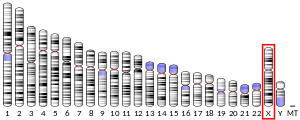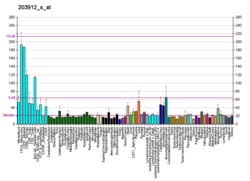DNASE1L1
Deoxyribonuclease-1-like 1 is an enzyme that in humans is encoded by the DNASE1L1 gene.[5][6][7]
This gene encodes a member of the deoxyribonuclease family and the protein shows high sequence similarity to lysosomal DNase I. Alternate transcriptional splice variants, encoding the same protein, have been characterized.[7]
References
- GRCh38: Ensembl release 89: ENSG00000013563 - Ensembl, May 2017
- GRCm38: Ensembl release 89: ENSMUSG00000019088 - Ensembl, May 2017
- "Human PubMed Reference:". National Center for Biotechnology Information, U.S. National Library of Medicine.
- "Mouse PubMed Reference:". National Center for Biotechnology Information, U.S. National Library of Medicine.
- Parrish JE, Ciccodicola A, Wehhert M, Cox GF, Chen E, Nelson DL (Feb 1996). "A muscle-specific DNase I-like gene in human Xq28". Hum Mol Genet. 4 (9): 1557–64. doi:10.1093/hmg/4.9.1557. PMID 8541839.
- Pergolizzi R, Appierto V, Bosetti A, DeBellis GL, Rovida E, Biunno I (Jul 1996). "Cloning of a gene encoding a DNase I-like endonuclease in the human Xq28 region". Gene. 168 (2): 267–70. doi:10.1016/0378-1119(95)00741-5. PMID 8654957.
- "Entrez Gene: DNASE1L1 deoxyribonuclease I-like 1".
Further reading
- Chen EY, Zollo M, Mazzarella R, et al. (1997). "Long-range sequence analysis in Xq28: thirteen known and six candidate genes in 219.4 kb of high GC DNA between the RCP/GCP and G6PD loci". Hum. Mol. Genet. 5 (5): 659–68. doi:10.1093/hmg/5.5.659. PMID 8733135.
- Rodriguez AM, Rodin D, Nomura H, et al. (1997). "Identification, localization, and expression of two novel human genes similar to deoxyribonuclease I". Genomics. 42 (3): 507–13. doi:10.1006/geno.1997.4748. PMID 9205125.
- Malferrari G, Mazza U, Tresoldi C, et al. (1999). "Molecular characterization of a novel endonuclease (Xib) and possible involvement in lysosomal glycogen storage disorders". Exp. Mol. Pathol. 66 (2): 123–30. doi:10.1006/exmp.1999.2254. PMID 10409440.
- Hartley JL, Temple GF, Brasch MA (2001). "DNA cloning using in vitro site-specific recombination". Genome Res. 10 (11): 1788–95. doi:10.1101/gr.143000. PMC 310948. PMID 11076863.
- Strausberg RL, Feingold EA, Grouse LH, et al. (2003). "Generation and initial analysis of more than 15,000 full-length human and mouse cDNA sequences". Proc. Natl. Acad. Sci. U.S.A. 99 (26): 16899–903. doi:10.1073/pnas.242603899. PMC 139241. PMID 12477932.
- Brandenberger R, Wei H, Zhang S, et al. (2005). "Transcriptome characterization elucidates signaling networks that control human ES cell growth and differentiation". Nat. Biotechnol. 22 (6): 707–16. doi:10.1038/nbt971. PMID 15146197.
- Gerhard DS, Wagner L, Feingold EA, et al. (2004). "The status, quality, and expansion of the NIH full-length cDNA project: the Mammalian Gene Collection (MGC)". Genome Res. 14 (10B): 2121–7. doi:10.1101/gr.2596504. PMC 528928. PMID 15489334.
- Wiemann S, Arlt D, Huber W, et al. (2004). "From ORFeome to biology: a functional genomics pipeline". Genome Res. 14 (10B): 2136–44. doi:10.1101/gr.2576704. PMC 528930. PMID 15489336.
- Ross MT, Grafham DV, Coffey AJ, et al. (2005). "The DNA sequence of the human X chromosome". Nature. 434 (7031): 325–37. doi:10.1038/nature03440. PMC 2665286. PMID 15772651.
- Shiokawa D, Shika Y, Saito K, et al. (2006). "Physical and biochemical properties of mammalian DNase X proteins: non-AUG translation initiation of porcine and bovine mRNAs for DNase X". Biochem. J. 392 (Pt 3): 511–7. doi:10.1042/BJ20051114. PMC 1316290. PMID 16107205.
- Mehrle A, Rosenfelder H, Schupp I, et al. (2006). "The LIFEdb database in 2006". Nucleic Acids Res. 34 (Database issue): D415–8. doi:10.1093/nar/gkj139. PMC 1347501. PMID 16381901.
- Coy JF, Velhagen I, Himmele R, et al. (1996). "Isolation, differential splicing and protein expression of a DNase on the human X chromosome". Cell Death Differ. 3 (2): 199–206. PMID 17180083.
This article is issued from Wikipedia. The text is licensed under Creative Commons - Attribution - Sharealike. Additional terms may apply for the media files.




